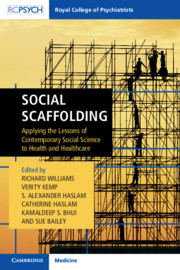Book contents
- Social Scaffolding
- Social Scaffolding
- Copyright page
- Contents
- Contributors
- Foreword
- Note
- Section 1 Schooling
- Section 2 Scoping
- Chapter 6 The Social Determinants of Mental Health
- Chapter 7 Laidback Science: Messages from Horizontal Epidemiology
- Chapter 8 Parity of Esteem for Mental Health
- Chapter 9 Belonging
- Chapter 10 Families and Communities: Their Meanings and Roles Across Ethnic Cultures
- Chapter 11 The Nature of Resilience: Coping with Adversity
- Chapter 12 The Value of Tolerance and the Tolerability of Competing Values
- Chapter 13 Towards Partnerships in Health and Social Care: A Coloquium of Approaches to Connectedness
- Chapter 14 Commentaries on Core Themes in Section 2
- Section 3 Sourcing
- Section 4 Scaffolding
- Section 5 Sustaining
- Index
- References
Chapter 14 - Commentaries on Core Themes in Section 2
from Section 2 - Scoping
Published online by Cambridge University Press: 14 June 2019
- Social Scaffolding
- Social Scaffolding
- Copyright page
- Contents
- Contributors
- Foreword
- Note
- Section 1 Schooling
- Section 2 Scoping
- Chapter 6 The Social Determinants of Mental Health
- Chapter 7 Laidback Science: Messages from Horizontal Epidemiology
- Chapter 8 Parity of Esteem for Mental Health
- Chapter 9 Belonging
- Chapter 10 Families and Communities: Their Meanings and Roles Across Ethnic Cultures
- Chapter 11 The Nature of Resilience: Coping with Adversity
- Chapter 12 The Value of Tolerance and the Tolerability of Competing Values
- Chapter 13 Towards Partnerships in Health and Social Care: A Coloquium of Approaches to Connectedness
- Chapter 14 Commentaries on Core Themes in Section 2
- Section 3 Sourcing
- Section 4 Scaffolding
- Section 5 Sustaining
- Index
- References
Summary
This chapter rounds off Section 2. In it, one of the authors, Jonathan Montgomery, begins by highlighting his view of the recurrent themes that arise from all eight chapters in this section.
Then, one of the editors, Alex Haslam, responds by substantially agreeing with Jonathan Montgomery. However, Haslam takes the opportunity to clarify one of the points that Montgomery makes with the intention of drawing attention to a key issue that runs like an artery through the body of this book. This concerns the nature of personalised healthcare and how this should best be understood and delivered. Haslam cautions that, in the process of developing personalised care, we should avoid the temptation to reduce peoples’ maladies to their individual conditions.
- Type
- Chapter
- Information
- Social ScaffoldingApplying the Lessons of Contemporary Social Science to Health and Healthcare, pp. 123 - 128Publisher: Cambridge University PressPrint publication year: 2019
References
- 1
- Cited by



